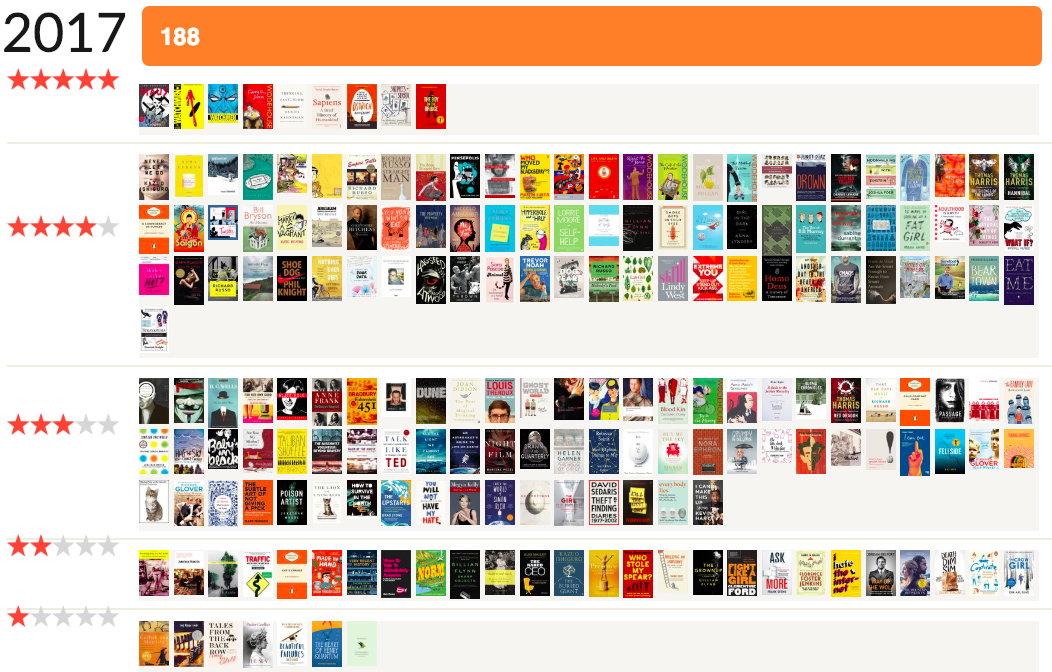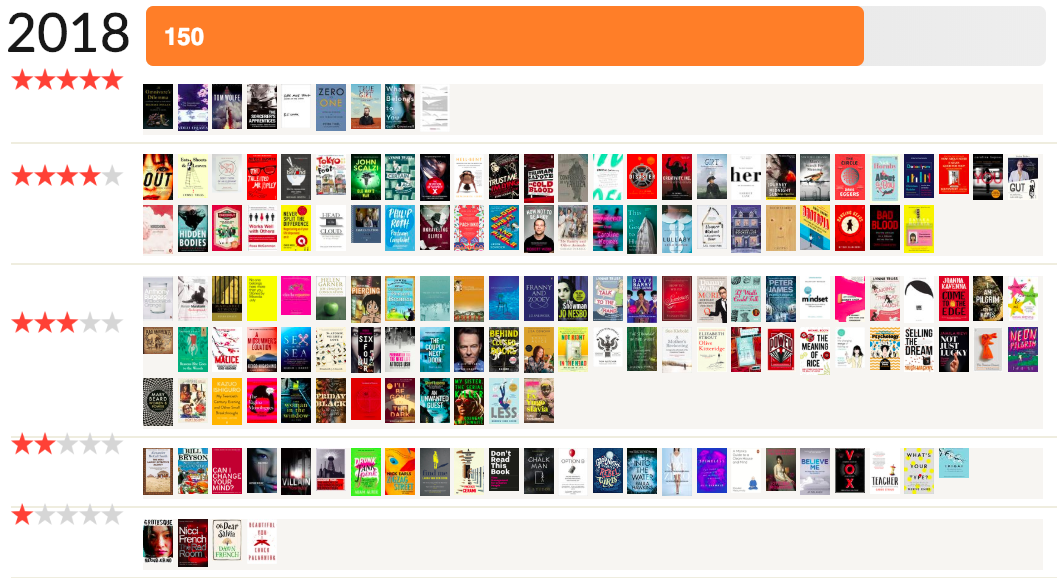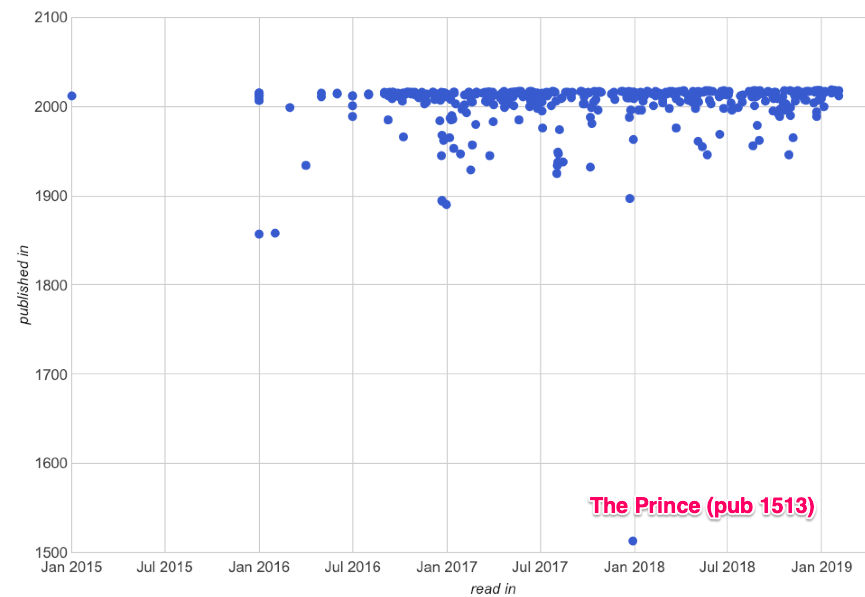I read 442 books in three years, and this is what I've learnt.
Three years ago I came across an article, which was about the time Jesse Itzler (serial entrepreneur, married to the Founder of Spanx) hired an ex-Navy SEAL to come live with his family for a month and give him some extreme fitness training. The article was intriguing enough that I then bought a copy of Itzler’s book, Living with a SEAL to read more of their story.
In the book, there was this moment when ‘SEAL’ ordered Itzler to do an insane amount of push-ups - and to Itzler’s surprise, he actually did it (even though it took forever and he paused after each one). He pushed his boundaries a lot further than what he had thought he could. As SEAL said, “when you think you’re done, you’re only at 40% of what your body is capable of doing. That’s just the limit that we put on ourselves.”.
For some reason, something in me clicked when I read that.
So I thought I would try it.
THE PLAN:
My plan was pretty simple,
First, pick an area in which you want to improve. I picked reading. I have always been an avid reader, but at the time I was going through a slump where I wasn’t finishing any book I started. After a long day at work, I came home exhausted and just wanted to watch something mindless on Netflix or scroll through Facebook again - in case anything earth-shattering happened since two minutes ago (nothing ever did).
I wanted to change this.Set an outrageous goal. To hell with SMART goals. Think of a ‘realistic’ goal and double, no, triple that.
In 2016, I set myself a goal of reading 100 books in a year. And it wouldn’t count unless I finished the entire book.Do everything humanly possible to hit that goal. I read on the train to work, at the airport, in bed, on the couch, at the bus stop. I read anywhere, anytime I could.
RESULTS:
By the end of 2016, I’ve read 104 books. I found that this was pretty doable.
So I thought I would push it even further, and set a goal of reading 200 books the next year. I didn’t manage to reach this, by the way, but I did finish 188 books in 2017. This was probably the end of the experiment for me, if the experiment was about seeing how far I could push myself (without losing my job, social life, personal health etc.).
Since then I’ve decided to dial things back down to a pace that I can comfortably maintain. For 2018 I finished 150 books, and this is roughly the same target I hope to reach for 2019, 2020, and years into the future.
In total: 442 books in three years (2016 - 2018). (A part of me yearns for a round number, say 500, but it is what it is.)
Books I read in 2016, categorised by how much I enjoyed / did not enjoy it. See the full list here on Goodreads.
Books finished in 2017. Full list here.
Books read in 2018. Full list here.
LOOKING BACK AT THE DATA
Since I’ve meticulously catalogued every single book I read during this period, there’s quite a bit of data. It’s really interesting for me to look at this and see clear patterns emerging. As it turns out, not only what you read says a lot about you, but also how, where, and when.
Let’s see,
Non-fiction vs fiction. I made a concerted effort to read more non-fiction than fiction books, and I did, but it was not easy. You can see that in 2016 this was easily done (67% NF vs 33% F), but in 2017 and 2018 I struggled (52% NF vs 48% F, almost an even split) because I was trying to get through more books in the year.
I now know that I can rip through a novel fairly quickly; but a book about management, science, or psychology - whilst thoroughly enjoyable - will take me longer. Maybe it’s because I take more breaks in between to digest the concepts?
(Or perhaps, just perhaps, there’s something about novels that makes them seem less real to me. Because they are ultimately just stories, I’m not taking them as seriously?)
The December Panic is real. Looking at the books read over time on a month-to-month basis, there are definitely some peaks and troughs.. Usually a particularly intense month (20 books) is followed by a more low-key month where I have a bit of a break. In fact, you can see a real dip in Nov 2016 and Nov 2017 - I was probably in the “this is too hard I’m taking a time out” stage. (2018 me was better at pacing herself.)
But by December every year, the panic set in and I moved on to the “it’s ok I only need to do 30 books this month that’s absolutely doable” aka deep denial stage. But because winning (even if it was against myself) was important to me, I pushed through and somehow made it happen.
me in December.
Although, it’s interesting that even though 2017 was, in a sense, a mad year because I was trying to finish 200 books in the year, I was actually reading slightly longer books that year:
2016 average length: 288 pages
2017 average length: 304 pages
2018 average length: 287 pages
It’s good to see I didn’t take the easy way out and pick really short books.
I suppose that makes sense because at the end of the day, this project is just something I did for myself; so there is really no point in cheating yourself - is there?
It appears I prefer books that are recently published. Look at this scatter chart! The majority of the titles I was attracted to were books published in the 2000s, many were actually the newest releases of that year. Not too keen on the 1800s - 1900s texts, it seems (but hey, I did try). One lonely standout was The Prince by Niccolò Machiavelli, which was published in 1513.
Is this a reflection of me chasing after the latest shiny new thing, or me trying to stay on top of recent research and ideas?
Maybe a bit of both.
(Or maybe 1800s texts are just, like, really DRY, man.)
WHAT HAVE I LEARNT? or, HOW DO YOU READ 150+ BOOKS IN A YEAR?
Set yourself an outrageous goal and run like mad to reach it. You just might surprise yourself. Remember: when you think you’re done, you’re only at 40% of what your body is capable of doing. That’s just the limit that we put on ourselves.
Or, like SEAL said, “everyday do something that makes you uncomfortable”.If someone calls you crazy, it’s a compliment.
Create favourable conditions for yourself to do what you do. Did you think I bought hundreds of books every year? Nope. I bought some (mostly secondhand or from a discount chain); but most of the books I read in the last three years came from a public library. Every two weeks or so, I brought home a stack of books borrowed from that library - and because I knew I had to return them by a certain date, I made sure to read them all by then.
So in that way, I made it easy for myself to sample a wide range of different genres and topics (because I’m not spending money on them, so it’s ok if it turns out to be a dud and I hate it, no big loss); and the artificial deadlines prevented procrastination and distractions.The first 50 pages in a book are the hardest to get through. But once you’ve reached page 51, it will get easier. Just keep going.
Never cheat yourself. What’s the point?
One book at a time. Don’t try to multitask. Give this one book you are reading all the attention it deserves.
Make it relevant: if you are travelling, it’s a lot of fun to read books written about that country / destination, or books written by authors coming from that area. In fact, it will add a different dimension to your trip and make it even better! I grabbed a few books from the local bookstore on my first trip to Serbia and tore right through them - the same books would probably never hold any interest for me before that point; but because I was there, it was incredibly enjoyable to recognise some of the locations, the people, and the culture mentioned in these books. Same when I went to Cambodia and then Japan (you can practically see a spike in books about Japan or written by Japanese authors during a particular month).
If you are interested, it will be interesting. Reading a book about life in North Korea? Pause to look up what Kim Jong-Il looks like. See a few memes. Check out his wife to see why they describe her the way they do. Watch a short South Korean K-pop music video. Now back to your book. This is how I read - sometimes it’s just a silly thing, e.g. let’s see how good looking Ted Bundy actually was (or was not) - it adds a visual to the words on the page. Once I finish a book, I’ll pop online to read more about the author, their other works, and perhaps a minor topic mentioned in the book. Which will then start me on a brand new tangent and before I know it, a book about North Korea has led me to a book about spiders.
Sometimes ignorance is best - ignore the reviews, try something different. Some of the best books I’ve read in the last few years are books I just happened to stumble upon, and not something I actively looked for.
Even the most horribly, infuriatingly bad books can teach you something. Finish it. I promise you can find at least one good thing you can take away from the worst book on the planet (maybe that one thing is not what’s written in there though. Maybe it’s something that occurs to you in the process. Maybe it’s something new you learn about yourself.)
Sometimes you have to read what you don’t want to. Not keen on politics (or, have a pretty strong lean to one side)? Think all the talk about animal cruelty or climate change is a bunch of bull? Make sure you try out a book or two written by someone whose opinion you may not agree with. Burst your own bubble. Listen. You may not change your mind, and that’s ok too; what’s important is that you listen to the other perspectives out there.
So, all of that just to say,
what are you waiting for?
Set yourself an outrageous goal this year, and run for it!






